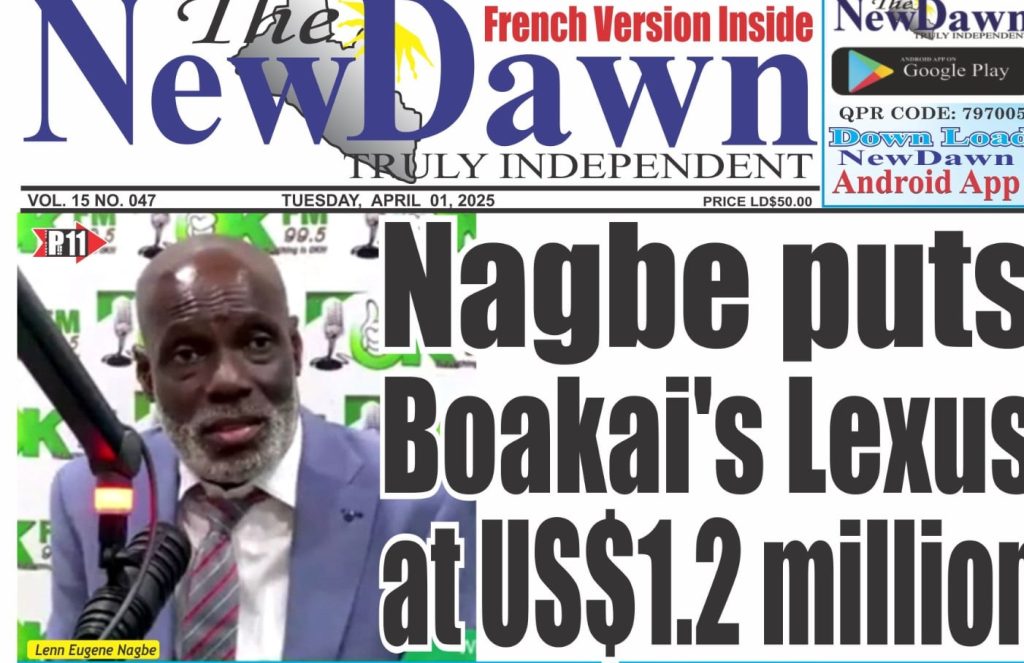The political landscape in Liberia is currently embroiled in a controversy surrounding the purchase of a new presidential vehicle. Former President Weah’s Chief of Staff, Lenn Eugene Nagbe, has publicly estimated the cost of President Boakai’s new bulletproof 2025 Lexus LX 700HR Super Ultra Luxury SUV at a staggering US$1.2 million. This revelation has sparked public outrage, given the severe economic hardships faced by the Liberian population. Critics argue that such extravagant spending is insensitive and misplaced, considering the pressing needs of the citizens. The controversy has further intensified the existing tensions between the former and current administrations, with both sides engaging in a blame game.
Nagbe’s assertion that the vehicle is specially made and armor-plated adds another layer to the debate. While the need for presidential security is undeniable, the exorbitant price tag raises questions about the justification for such a high-end purchase. Could a comparable level of security have been achieved at a lower cost? This question resonates with the public, who are struggling with basic necessities and are likely to perceive the expenditure as excessive and out of touch with their reality. The timing of the purchase, amidst widespread economic hardship, further fuels the perception of misplaced priorities.
Adding to the complexity of the situation is the separate controversy regarding vehicles left behind by former President Weah. Nagbe has vehemently denied claims that Weah took a government vehicle upon leaving office, insisting that the vehicle in question is privately owned by Weah and was never a government asset. He further clarified that the government, through the Ministry of Finance and Development Planning, procured 15 Land Cruisers for the Executive Protection Service (EPS) in 2023. Upon Weah’s departure, these vehicles, along with two bulletproof vehicles acquired in 2022 and another previously gifted to Weah by former President Sirleaf, were all turned over to the EPS Director, Sam Gaye.
Nagbe’s defense of the former president and his pointed criticism of the Boakai administration highlight a growing rift between the two camps. He explicitly blamed the current administration for the expenditures on the new presidential vehicles, arguing that former President Weah is not responsible for the decisions of the current government. He further urged President Boakai to focus on effective governance rather than engaging in what he perceives as misplaced blame. This public exchange underscores the escalating tension and the apparent unwillingness of either side to accept responsibility for perceived excesses.
The controversy surrounding the presidential vehicles serves as a microcosm of the larger political dynamics in Liberia. The public outcry reflects a deep-seated frustration with economic hardship and a perception of disconnect between the government and the governed. The blame game between the former and current administrations further erodes public trust and hinders constructive dialogue on critical national issues. The situation calls for greater transparency and accountability from both sides, as well as a more concerted effort to address the underlying economic challenges facing the Liberian people.
Ultimately, the debate over the cost of presidential vehicles underscores a fundamental question about priorities and resource allocation in a nation grappling with economic hardship. The incident serves as a reminder of the importance of responsible governance and the need for public officials to be mindful of the optics of their actions, particularly in times of economic austerity. The ongoing controversy and the ensuing public discourse will likely shape the political landscape in Liberia in the coming months and years, highlighting the delicate balance between security needs, economic realities, and public perception.














